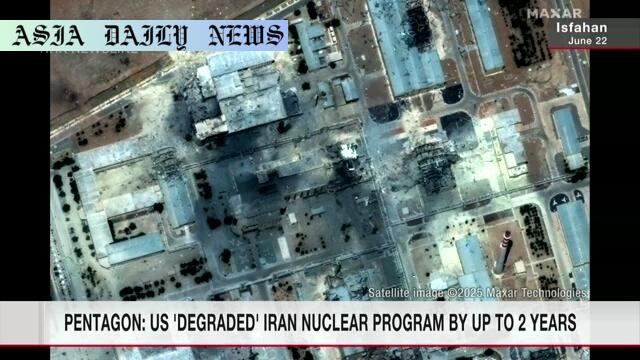Iran’s nuclear program has been degraded by up to two years following targeted airstrikes on key uranium enrichment facilities.

Introduction: The Impact of Airstrikes on Iran’s Nuclear Program
The Pentagon has recently announced that last month’s airstrikes targeting Iran’s nuclear facilities have significantly set back their nuclear program by up to two years. This revelation has stirred widespread debate over the effectiveness of such military interventions and the future trajectory of Iran’s nuclear ambitions. While U.S. President Donald Trump has confidently stated that Iran’s key nuclear sites have been obliterated, experts, including IAEA Director General Rafael Grossi, have provided a more nuanced perspective, acknowledging serious damage but clarifying that it is not total.
Key Targets: Destruction of Uranium Enrichment Facilities
The airstrikes specifically targeted critical uranium enrichment facilities essential to Iran’s nuclear development capabilities. Pentagon spokesperson Sean Parnell emphasized that the raids not only destroyed operational facilities but also shattered key infrastructural components required for building a nuclear bomb. The result, according to Parnell, is a “severely degraded” nuclear program that could take years to recover. Beyond the physical destruction, the attacks may also affect Iran’s long-term ambition to build a nuclear weapon, though Iran remains resolute in continuing its program.
Global Implications and Iran’s Response
The international community has closely monitored Iran’s nuclear program, with many nations expressing concerns over the potential proliferation of nuclear weapons. The U.S. airstrikes have reignited tensions in the region, with Iran vowing to press ahead with its nuclear development despite the setbacks. This defiance raises questions about the efficacy of military interventions in curbing nuclear ambitions and the need for diplomatic solutions.
The Role of the International Atomic Energy Agency
The International Atomic Energy Agency (IAEA) has played a crucial role in providing an impartial assessment of the situation. IAEA Director General Grossi’s statement underscores the complexities of assessing the longer-term impact of the airstrikes, especially given Iran’s determination to rebuild its infrastructure. The organization’s findings highlight the importance of continued international oversight and collaboration to ensure regional stability.
Conclusion: Balancing Military Action with Diplomacy
While the Pentagon’s claims of delaying Iran’s nuclear program are significant, they also open up larger questions about the effectiveness and consequences of such actions. Military interventions can yield immediate results, but their long-term success often depends on complementary diplomatic measures. As Iran continues to reaffirm its commitment to its nuclear ambitions, the global community must weigh the costs and benefits of ongoing conflict versus engaging in dialogue. These developments serve as a stark reminder of the delicate balance required to address critical security concerns without escalating tensions further.
Commentary
Reflection on the Airstrikes and Their Impact
The recent airstrikes targeting Iran’s nuclear facilities have undoubtedly marked a significant moment in the ongoing geopolitical struggles surrounding nuclear proliferation. From a tactical perspective, the delays imposed on Iran’s nuclear program represent a strategic victory for the U.S. and its allies, who view such developments as critical threats to regional and global security. However, the repercussions of such acts extend far beyond immediate outcomes, leaving important questions about long-term stability and diplomacy.
Challenges of a Military-First Approach
While the Pentagon’s assessment highlights the operational success of these strikes, it is worth considering the broader implications. Military interventions often provide short-term solutions to complex issues. By delaying Iran’s nuclear ambitions, there may be temporary relief, but such actions risk escalating tensions or driving adversaries to double down on their objectives. Moreover, the destruction of facilities does not equate to a complete halt in ambition, as Iran’s declared commitment to continue its nuclear program demonstrates.
The Need for Diplomatic Engagement
This situation underscores the necessity of pairing military actions with sustained diplomatic efforts. The international community, including organizations like the IAEA, must remain actively involved in monitoring and mediating the situation. Effective negotiations could lead to long-term solutions that military measures alone cannot achieve. Without dialogue, the cycle of provocation and retaliation is likely to perpetuate, leaving the root issues unresolved.
A Path Forward
In conclusion, while the airstrikes have delivered a significant setback to Iran’s nuclear program, it is essential to recognize that the challenge is far from over. As tensions remain high, a balanced approach that leverages both military strength and diplomatic engagement will be critical to achieving durable peace. It is in this delicate balance that the real potential for progress lies, offering an opportunity to address one of the most pressing security challenges of our time. The world must choose collaboration over conflict to ensure a stable and secure future for all.


